Key takeaways:
- Author voice is a unique blend of personality, experience, and perspective that enhances authenticity and connects with readers.
- Engaging in regular writing, reading widely, and experimenting with different styles can help in developing a distinct voice.
- Overcoming obstacles like self-doubt and writer’s block is crucial for authentic self-expression and building confidence in one’s voice.
- Sharing personal anecdotes and being vulnerable in storytelling fosters deeper connections with readers.
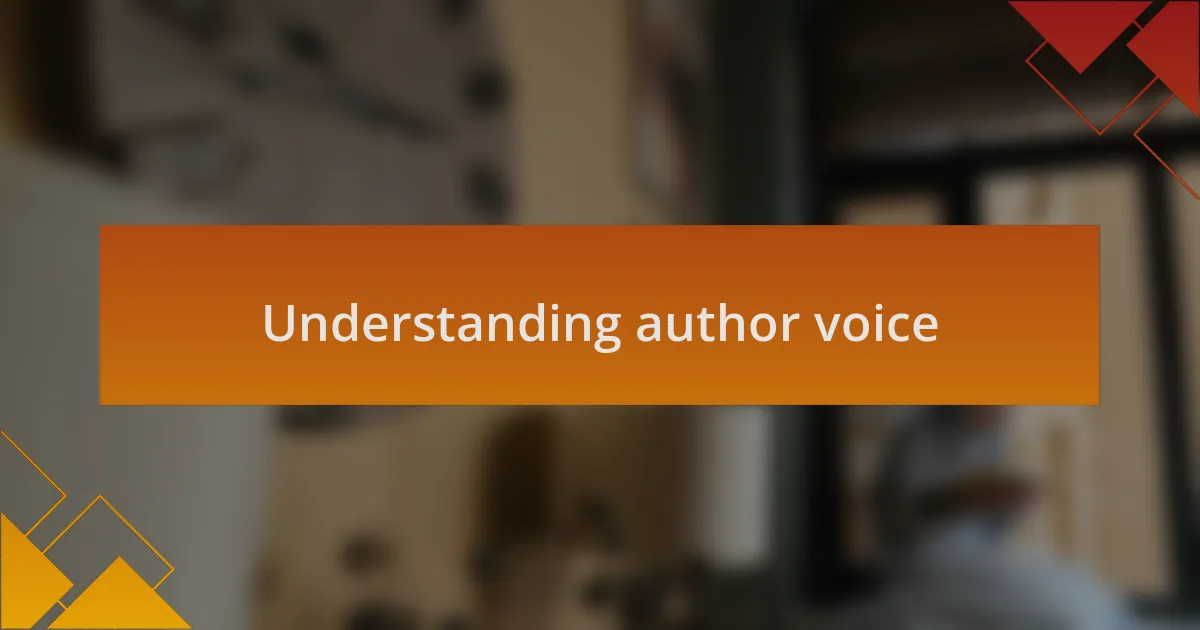
Understanding author voice
Understanding your author voice is like discovering a distinct musical style; it’s a unique blend of your personality, experience, and perspective woven into your writing. I remember the first time I read my work aloud and realized it didn’t sound like anyone else’s. That moment was crucial; I could feel the authenticity I had been searching for, a voice that was distinctly mine.
When I experimented with different genres, I found that my voice evolved with each attempt. One day, while writing poetry, the fluidity of my thoughts matched the rhythm of my words, and I felt this deep, emotional connection. How often do we overlook the significance of our emotional responses in our writing? Embracing my feelings allowed me to infuse my work with sincerity, making it resonate more deeply with readers.
Author voice also encompasses the choices we make in language, tone, and even sentence structure. I often ask myself, “How would I say this in a conversation with a friend?” This question helps me maintain a genuine tone while also fostering a deeper connection with my audience. Through these interactions, I’ve discovered that my voice not only reflects who I am but also invites others into my world.
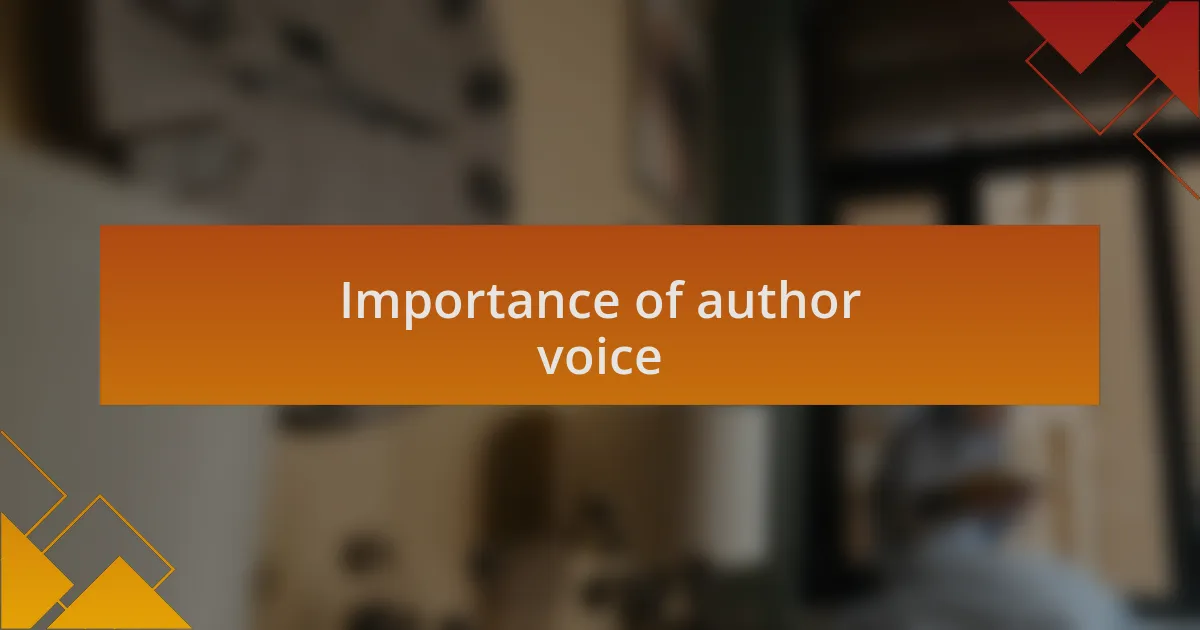
Importance of author voice
Author voice holds immense importance in independent publishing because it sets a writer apart in a crowded marketplace. When I first dipped my toes into self-publishing, the sheer number of authors was overwhelming. I realized that without a strong, distinctive voice, my words risked disappearing into the background. This voice not only reflects my personality but also enhances the authenticity of my storytelling, making it easier for readers to connect with my experiences.
As I navigated my writing journey, I discovered that my author voice evolved with every story I penned. I vividly recall a time when I shifted from crafting serious narratives to embracing humor in my writing. This transition didn’t just change the tone; it transformed how my audience responded. Have you ever felt an emotional shift when a writer’s voice resonated with you? I certainly have. That emotional recognition can create a bond that turns casual readers into loyal fans.
Furthermore, an engaging author voice creates a sense of intimacy and trust between the writer and the reader. When I write as if I’m chatting with a close friend, I notice that my words flow more freely, and my readers become more invested in my work. That connection is fundamental—if your audience feels your passion, they’re far more likely to champion your work. How can we, as authors, cultivate that voice? By being unapologetically ourselves and allowing our unique perspectives to shine through every page.
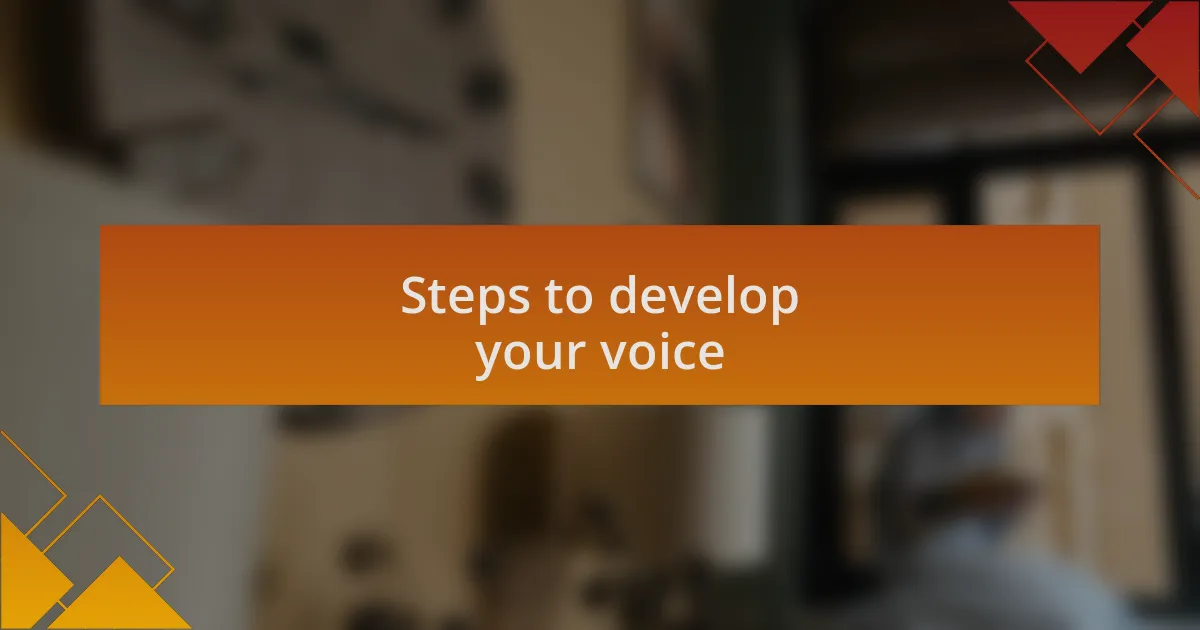
Steps to develop your voice
To develop your author voice, the first step is to read widely and listen actively. I recall spending countless hours reading different genres, absorbing various styles. This exposure helped me to identify what resonated with me and what didn’t. Have you ever found a phrase or style that just clicked for you? Analyzing such moments can guide your own writing.
Next, I recommend writing regularly while experimenting with different tones and styles. One day, I would write a fierce, passionate essay, and the next, a lighthearted blog post. This experimentation was crucial in uncovering my voice. It was during these writing sessions that I began to embrace the quirks I once thought were imperfections. What parts of your personality can enhance your storytelling?
Lastly, seek feedback from others. When I shared my work with fellow writers, their insights opened my eyes to new dimensions of my voice. It’s easy to get trapped in our own world, allowing our voice to be stifled. So, I encourage you to ask, how do others perceive your writing? This external perspective can be the key to unlocking the uniqueness that defines your voice.
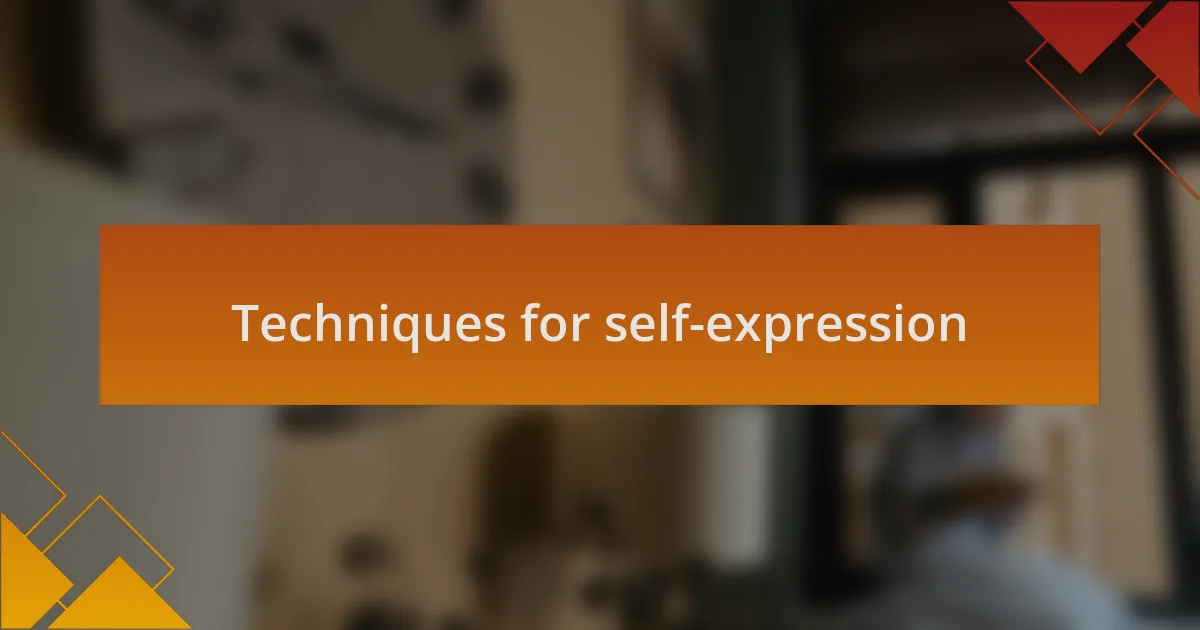
Techniques for self-expression
To truly express myself, I often turned to journaling as a tool for self-exploration. Each entry was a safe space where I could let my guard down, voice my thoughts, and even spill my emotions onto the page. Have you ever tried writing without a filter? That freedom transformed my writing, allowing my genuine voice to emerge.
Another technique I found effective was to mimic the styles of authors I admired, not to copy them, but to understand their rhythms. There was a period when I wrote short pieces imitating a favorite author’s tone, just to see how it felt. It was like trying on different outfits; some styles felt comfortable, while others didn’t fit at all. That playful experimentation truly sharpened my unique sound.
I also discovered the power of storytelling through personal anecdotes. Sharing my own experiences—whether they were joyous or challenging—allowed my readers to connect with me on a deeper level. Think about it: when you read a story that’s authentic, doesn’t it resonate more? Those moments of vulnerability in my writing made my voice more relatable, inviting my audience to engage with my journey.
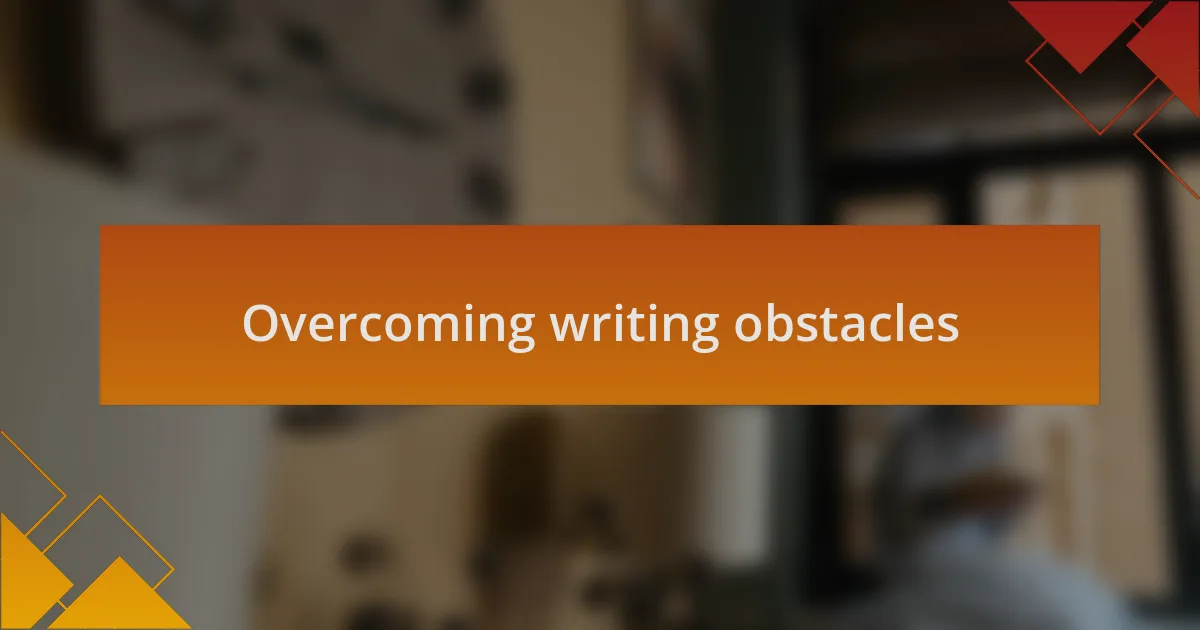
Overcoming writing obstacles
Writers often encounter obstacles that can feel overwhelming, such as self-doubt or a fear of criticism. I remember a time when I was paralyzed by the thought of whether my stories would resonate with anyone. It struck me that every author experiences these feelings, and I realized that confronting these fears head-on was the first step toward breaking through them. I started sharing my drafts with trusted friends, allowing their feedback to guide me rather than deter me.
Another challenge I faced was writer’s block, which I discovered can be particularly frustrating. There were days when the words simply wouldn’t flow, and I felt like I was staring at a blank page forever. During these moments, I learned to shift my environment or even just change the time of day I wrote. Once, after a long walk in nature, I returned to my desk filled with fresh inspiration. Have you ever noticed how a change of scenery can spark creativity?
Something unexpected also helped me overcome writing obstacles: embracing imperfection. Early in my journey, I often agonized over every word, worrying about how my writing would be perceived. It took me a while to realize that allowing myself to write imperfectly was freeing. One day, I decided to write a piece without editing it for an entire hour. What emerged was raw, honest, and far more reflective of my true voice than anything I had meticulously crafted before. Have you tried that? I found it empowering, and it truly unlocked a more authentic expression in my work.
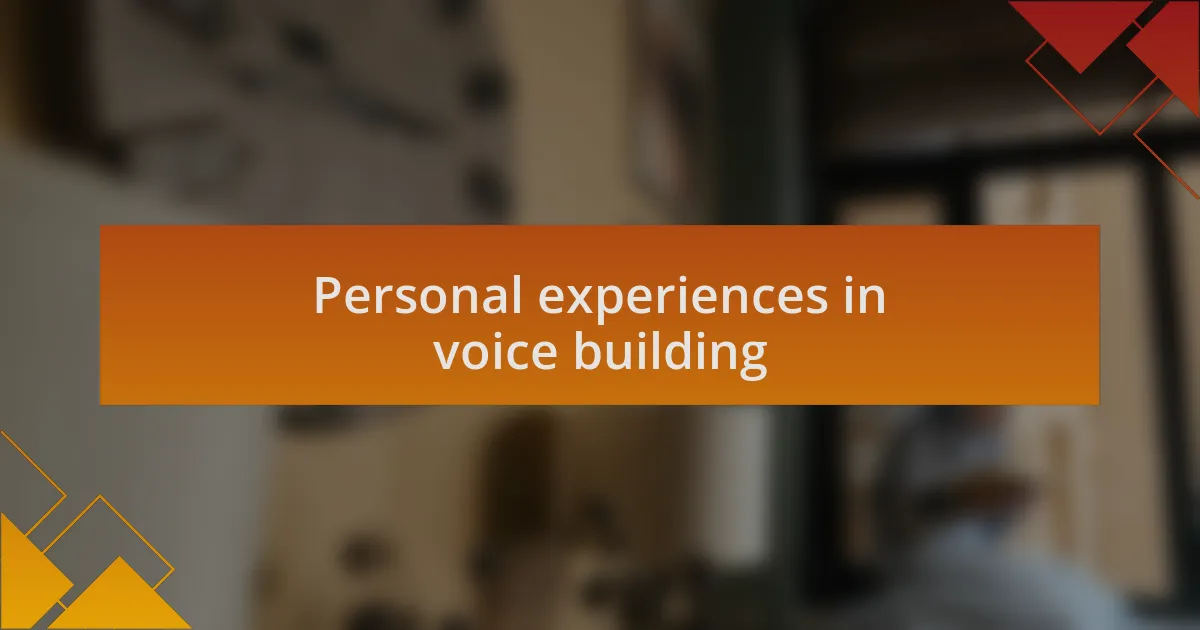
Personal experiences in voice building
Finding my author voice has been a journey filled with exploration and self-discovery. I remember when I decided to write a short story based on a challenge from a writing group. As I poured my thoughts onto the page, I instinctively gravitated toward a conversational tone that felt more like a chat with a friend than formal storytelling. It hit me then: my voice emerged naturally when I allowed myself to be vulnerable and personal. Have you experienced that click when your authentic self shines through your words?
In another instance, I was inspired by a particularly moving conversation with a mentor about the power of storytelling. He emphasized how our unique perspectives add depth to our narratives. Reflecting on my own life experiences, I began to weave those moments into my writing, whether it was family anecdotes or challenging life lessons. I found that incorporating such elements made my narratives not only relatable but also richer. It made me wonder, how often do we overlook the stories inside us that could truly resonate with others?
I also encountered a phase where I felt compelled to mimic the styles of authors I admired. As tempting as it was, I quickly noticed that my writing lost its spark when I did this. One day, I deleted an entire chapter that felt foreign to me, and with that, a wave of relief washed over me. It was a moment of clarity: my voice didn’t need to sound like anyone else’s. Instead, embracing my quirks and idiosyncrasies became a turning point. Have you ever felt that freedom in abandoning imitation, trusting your voice instead? It was liberating and ultimately led to the authenticity I had been seeking.